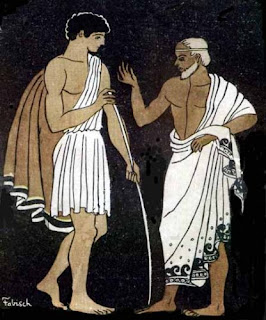 |
| Telemachus and Mentor |
Having finished the first three chapters of Ulysses, our first reading assignment
for this project, I thought I’d take some time to write out a few thoughts,
keeping in mind a quotation that one of my old professors recommended we write
at the beginning of our journals for his class: “How do I know what I think
till I see what I say?”
These first three chapters are sometimes referred to as the
Telemachiad, since in the scheme of parallels to Homer’s Odyssey they represent the first four books of Homer’s epic, which
focus not on Odysseus but on his son, Telemachus. In teaching the Odyssey to freshmen, I find these four
chapters useful because I can draw parallels between Telemachus and my
students. Like embattled incoming high school freshmen, Telemachus is facing a
series of challenges: an absent father whom he has never known; a chaotic,
ungoverned island home; a mother wracked by grief and increasingly at wits’
end; and a household swarming with uncouth suitors to his mother’s hand who party
endlessly on his family’s bounty. In the first episode of the story, the
goddess Athena comes down from Olympus and visits Telemachus, inspiring him
with a plan for how he might stop clinging to his boyhood and become a man. He
must call an assembly on Ithaca, publicly denounce the suitors, then travel to
Pylos and Sparta to meet with his father’s old war comrades and ask if they
know anything of his whereabouts. In the remainder of the opening four books of
the epic, Telemachus follows her instructions, gaining experience out in the
world, testing his mettle in rhetorical situations, learning from the example
of a peer named Pisistratus, and, ultimately, accomplishing his goal by
learning that his father is alive.
What does Joyce accomplish by comparing Stephen Dedalus to
Telemachus? Most immediately, he puts Stephen in his place. For all of
Stephen’s intellectual gymnastics and self-dramatizing internal monologues, he
is still young and immature, like Telemachus. And like Telemachus, this story
in which he appears is not named for him. In the notes to the first chapter,
Jeri Johnson quotes an idea from the literary critic Hugh Kenner that I found
helpful: “Stephen thinks he is in a book called Hamlet and never discovers that it’s really called Ulysses and that he is a supporting
actor, not the lead” (772). Stephen may think he is a tragic hero, the Prince
of Denmark, as he walks along Sandymount Strand, brooding over mortality, epistemology,
and other intellectual problems, but in this novel he is perhaps more like the
young prince of Ithaca despairing on the beach after his assembly ends in
discord and recriminations from the suitors. On the beach in Ithaca, divine
inspiration and encouragement come to Telemachus in the guise of Mentor, a
family friend. For Stephen, no gods appear to rescue him from the tangle of his
thoughts. In fact, Stephen is not so sure that there is any divine presence out
there. When his towermate Haines asks him whether he believes in the “idea of a
personal God,” Stephen tells him that “You behold in me ... a horrible example
of free thought” (20). Just as Telemachus has his moments of doubt in the gods,
though, Stephen’s rejection of religious belief seems to waver at times. He
tells Haines that one of the two master he serves is the holy Roman catholic
and apostolic church, and Buck Mulligan tells him that “you have the cursed
jesuit strain in you, only it’s injected the wrong way” (8). Stephen’s
personality has been inflected by his Jesuit education despite his
free-thinking. He uses literature as a kind of sacred scripture, examines his
consciousness to the point of omphalos-gazing,
and seems to prefer spiritual exercises to physical ones. Looking at the water
while walking along the strand he acknowledges “I am not a strong swimmer”
(45).
Like Telemachus, Stephen has a troubled relationship with
his mother (or had; on her deathbed,
Stephen refused to kneel down and pray as she requested him to do). His frenemy
Buck Mulligan mockingly calls him “Japhet in search of a father” (18), drawing
another parallel with Telemachus (and signalling a key theme in the novel,
according to a footnote at the top of page 773). Stephen’s Ireland is just as
troubled an island, probably more so, than Ithaca. In these first three
chapters of the novel, his encounters with others are less fruitful or at least
more complicated than those of Telemachus. Buck Mulligan and Haines clearly do
not provide Stephen with the support and positive example that Pisistratus
offers Telemachus; nor does the anti-Semitic Mr. Deasy encourage Stephen as
Nestor and Menelaus do the young prince. No wonder that Stephen is left to
wrestle Proteus alone in the third chapter. His attempts to connect with other
human beings have so far been “a disappointed bridge” (25), to quote his witty
definition of a pier, a quip which itself fails to connect with the students to
whom Stephen makes it.
“You were not born to be a teacher,” Mr. Deasy tells
Stephen, who replies, “A learner, rather” (35). So perhaps Stephen understands who
he is after all: a searcher like Telemachus rather than a master like Odysseus.
Frank K.
.jpg)







